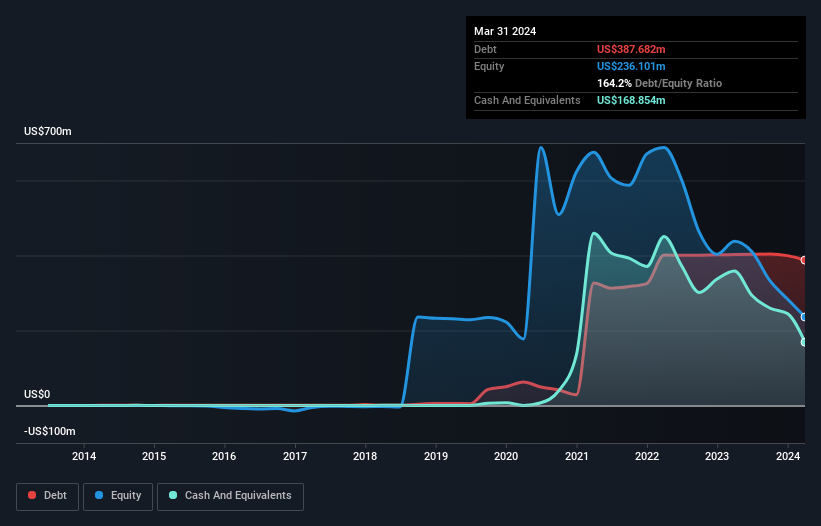- United States
- /
- Interactive Media and Services
- /
- NYSE:FUBO
fuboTV (NYSE:FUBO) Has Debt But No Earnings; Should You Worry?
The external fund manager backed by Berkshire Hathaway's Charlie Munger, Li Lu, makes no bones about it when he says 'The biggest investment risk is not the volatility of prices, but whether you will suffer a permanent loss of capital.' When we think about how risky a company is, we always like to look at its use of debt, since debt overload can lead to ruin. Importantly, fuboTV Inc. (NYSE:FUBO) does carry debt. But the more important question is: how much risk is that debt creating?
When Is Debt A Problem?
Debt assists a business until the business has trouble paying it off, either with new capital or with free cash flow. In the worst case scenario, a company can go bankrupt if it cannot pay its creditors. However, a more frequent (but still costly) occurrence is where a company must issue shares at bargain-basement prices, permanently diluting shareholders, just to shore up its balance sheet. Of course, plenty of companies use debt to fund growth, without any negative consequences. The first step when considering a company's debt levels is to consider its cash and debt together.
Check out our latest analysis for fuboTV
What Is fuboTV's Net Debt?
The chart below, which you can click on for greater detail, shows that fuboTV had US$387.7m in debt in March 2024; about the same as the year before. However, because it has a cash reserve of US$168.9m, its net debt is less, at about US$218.8m.

A Look At fuboTV's Liabilities
Zooming in on the latest balance sheet data, we can see that fuboTV had liabilities of US$489.5m due within 12 months and liabilities of US$418.0m due beyond that. Offsetting these obligations, it had cash of US$168.9m as well as receivables valued at US$73.6m due within 12 months. So it has liabilities totalling US$665.1m more than its cash and near-term receivables, combined.
This deficit casts a shadow over the US$389.8m company, like a colossus towering over mere mortals. So we'd watch its balance sheet closely, without a doubt. After all, fuboTV would likely require a major re-capitalisation if it had to pay its creditors today. There's no doubt that we learn most about debt from the balance sheet. But it is future earnings, more than anything, that will determine fuboTV's ability to maintain a healthy balance sheet going forward. So if you want to see what the professionals think, you might find this free report on analyst profit forecasts to be interesting.
In the last year fuboTV wasn't profitable at an EBIT level, but managed to grow its revenue by 33%, to US$1.4b. With any luck the company will be able to grow its way to profitability.
Caveat Emptor
While we can certainly appreciate fuboTV's revenue growth, its earnings before interest and tax (EBIT) loss is not ideal. Its EBIT loss was a whopping US$271m. When we look at that alongside the significant liabilities, we're not particularly confident about the company. It would need to improve its operations quickly for us to be interested in it. Not least because it had negative free cash flow of US$189m over the last twelve months. That means it's on the risky side of things. When analysing debt levels, the balance sheet is the obvious place to start. However, not all investment risk resides within the balance sheet - far from it. Be aware that fuboTV is showing 3 warning signs in our investment analysis , you should know about...
If, after all that, you're more interested in a fast growing company with a rock-solid balance sheet, then check out our list of net cash growth stocks without delay.
Valuation is complex, but we're here to simplify it.
Discover if fuboTV might be undervalued or overvalued with our detailed analysis, featuring fair value estimates, potential risks, dividends, insider trades, and its financial condition.
Access Free AnalysisHave feedback on this article? Concerned about the content? Get in touch with us directly. Alternatively, email editorial-team (at) simplywallst.com.
This article by Simply Wall St is general in nature. We provide commentary based on historical data and analyst forecasts only using an unbiased methodology and our articles are not intended to be financial advice. It does not constitute a recommendation to buy or sell any stock, and does not take account of your objectives, or your financial situation. We aim to bring you long-term focused analysis driven by fundamental data. Note that our analysis may not factor in the latest price-sensitive company announcements or qualitative material. Simply Wall St has no position in any stocks mentioned.
About NYSE:FUBO
fuboTV
Operates a live TV streaming platform for live sports, news, and entertainment content in the United States and internationally.
Acceptable track record with mediocre balance sheet.
Similar Companies
Market Insights
Community Narratives


